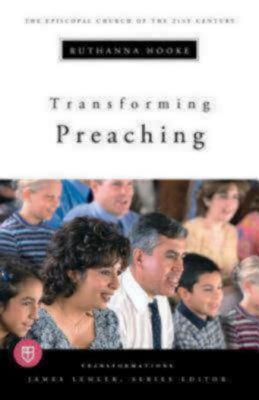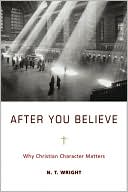Transforming Preaching
At once “travel guide” and vision for the future, the Transformation series is good news for the Episcopal Church at a time of fast and furious demographic and social change. Series contributors - recognized experts in their fields - analyze our present plight, point to the seeds of change already at work transforming the church, and outline a positive new way forward. What kinds of churches are most ready for transformation? What are the essential tools? What will give us strength,...
Search in google:
Preaching is one of the more "transformable" aspects of the church's life. Performance teacher Ruthanna Hooke, writing for both clergy and lay leaders, delivers the good and bad news about Episcopalians and preaching. She explains why preaching is more difficult than ever today, and provides essential models and spiritual practices in order to transform both the creators of preaching and its listeners as both participate in sermons.
Transforming Preaching\ \ By RUTHANNA B. HOOKE \ Church Publishing\ Copyright © 2010 Ruthanna B. Hooke\ All right reserved.\ ISBN: 978-0-89869-646-2 \ \ \ Chapter One\ Why Is It Frightening to Preach? \ Then I said, "Ah, Lord GOD! Truly I do not know how to speak, for I am only a boy." But the LORD said to me, "Do not say, 'I am only a boy'; for you shall go to all to whom I send you.... I have put my words in your mouth." (Jeremiah 1:6–9)\ At the beginning of every semester I ask my students to choose a single word to describe how they feel to be in a preaching class. Some will choose the word "excited," but most pick words along the lines of "nervous," "terrified," or "petrified." Why are they afraid, and what are they afraid of? What is it about the act of preaching that makes it so terrifying? What makes preaching such a daunting task, so difficult to do well? Most of my students view preaching as a central part of their ministry, and they desperately want to do it well, which is one reason they find the task frightening. But why is it crucial that preaching be done well, and what would "doing it well" look like? What are the criteria of successful or effective or faithful (even the right adjective is hard to find) preaching?\ The series of which this book is a part considers the ways that various practices of the church—stewardship, evangelism, reading the Bible—need to be transformed in order for the church to continue to be vital in the twenty-first century. These books respond to a sense of crisis in the church today, a crisis that challenges the church's life and practices in ways that it has not been challenged before. I am mindful of this crisis and these challenges too, yet in my experience the most serious difficulties that preachers face in undertaking the task of preaching are perennial ones. The task of preaching may be more demanding today for various reasons, and I will consider them in the course of this book; yet I believe the most daunting aspects of the preaching task are ones that have been with preachers, in one form or another, for centuries. The title of a recent book in the field of homiletics, What's the Matter with Preaching Today?, is a quotation from a Harry Emerson Fosdick essay of the same name written in 1928, which itself is commenting on a nineteenth-century diatribe about the sorry state of preaching at that time. This sequence suggests that there is always a sense that something is wrong with preaching; it is never being done as well as it should be.\ We will see why the challenges of the preaching task are perennial ones if we examine the fear of preaching more closely. What makes preaching so terrifying? For one thing, preaching is a form of public speaking, itself something that intimidates many people. The phenomenon of stage fright is so consuming that it can drive even the most experienced actors away from the stage—even Lawrence Olivier is said to have suffered terribly from it later in his career. Many an actor or public speaker reports having a recurring nightmare of getting up to speak to others and losing the manuscript, having no clothes on, forgetting how to form words, speaking in a foreign language. Another variant on this nightmare involves getting lost on the way to the speaking engagement and never arriving at all. Clearly, there is much carryover between the fear of public speaking in general and the fear of preaching. However, I am always interested to note that the students who come to me with experience in other forms of public speaking usually find preaching just as frightening as those who have none. Former trial lawyers, salespeople, business men or women, and musicians will occasionally begin the preaching class claiming a greater confidence, but usually that self-assurance dissipates once they begin the practice of preaching. So what is it about preaching that makes it even more frightening than other forms of public speaking?\ Another interesting fact about the fear of preaching is that it does not go away with practice, but rather tends to increase, or at least to hold steady, for a long time into one's preaching ministry. I have been preaching for over ten years, and the experience of my heart pounding and my legs locking as I get up to preach is still with me. It is similar to beginning to learn rock climbing, when I stood at the top of a cliff, attached to a rope, and had to launch myself over the side, trusting in the rope and in my climbing partners to hold me up over the abyss. The mind and body absolutely rebel against taking this step over the side into what feels like certain annihilation. The moment before I speak the first word of my sermon feels like this—like a launching over the abyss, into pure terror, while every fiber resists. This sense of risk is captured in preacher Barbara Brown Taylor's description of this same moment:\ Watching a preacher climb into the pulpit is a lot like watching a tightrope walker climb onto the platform as the drum roll begins. The first clears her throat and spreads out her notes; the second loosens his shoulders and stretches out one rosin-soled foot to test the taut rope. Then both step out into the air, trusting everything they have done to prepare for this moment as they surrender themselves to it, counting now on something beyond themselves to help them do what they love and fear and most want to do. If they reach the other side without falling, it is skill but it is also grace—a benevolent God's decision to let these daredevils tread the high places where ordinary mortals have the good sense not to go.\ Frederick Buechner also evokes memorably the momentous silence just before the sermon begins, when he describes how the preacher "pulls the little cord that turns on the lectern light and deals out his note cards like a riverboat gambler. The stakes have never been higher." The sense of risk and danger, the awareness of the momentousness of the occasion, the sense of high stakes and of the need to trust and surrender—all these are aspects of the fear of preaching, and as both these preachers seem to acknowledge, such fear does not necessarily go away with more experience. I am sorry to have to tell my students this, and yet, as I also tell them, I believe there is something necessary about the fear that accompanies preaching. I believe it is not meant to go away; rather, the challenge is to understand why preaching has to be scary, and also to understand how to work with the fear in a creative way, so that our preaching can be what it needs to be.\ * * *\ the challenge of proclamation\ There are many reasons why preaching is a daunting and frightening undertaking. Let's consider, for starters, the role that preaching is meant to serve in the church: it is one of the primary ways that the Christian faith is taught, handed on, and commended to the church and the world. A sermon is the moment in the worship service when the preacher takes the words of Scripture and the elements of the liturgy and seeks not only to explain them, but to make them relevant to the world today. In the sermon the preacher shows why we should care about the Bible verses that have been read and the traditional words and actions of the liturgy. Why does all of this matter to us today? The preacher's task is to bridge a gap between the texts and tradition of the church, and the world that we live in now, and to show why the Christian faith is the best way to make sense of this world and to give meaning to our lives. This is an exceptionally challenging task, because it is not always clear how a two-thousand-year-old text and centuries-old traditions ought to be what we turn to today in order to make meaning out of life. Moreover, the truths of these texts and traditions (that God is the all-powerful and all-loving Creator of the universe; that God has made an unalterable difference in the world through the life, death, and resurrection of Jesus Christ; that God is drawing us toward an eschatological fulfillment) can often be hard to proclaim in the face of suffering and evil. Perhaps the difficulty of proclaiming these truths is greater now than it has ever been, but this proclamation has always been a challenging one to make, and this is what preachers are charged with doing.\ In order to make the truths of Scripture relevant to our times, preachers also must have the skill of being able to read the times accurately and insightfully, to interpret contemporary culture as well as biblical texts. This entails being able to put local events into a broader cultural context, to see the forest as well as the trees. If a marriage is in trouble, what are the larger cultural and economic forces pulling this relationship apart? What are the broader economic circumstances behind the closing of a local factory? Preaching well means being able to see and articulate these connections. E. M. Forster refers to this ability as "seeing life steadily and seeing it whole," and it is a trait that great leaders have. Barack Obama, for instance, demonstrates an ability to read the mood and the circumstances of these times, to analyze the maelstrom of current events in a larger historical context so as to make meaning of them. He showed this ability in analyzing his own life in his memoir Dreams of My Father, in which he wrote about his own local, personal experiences with race, belonging, place, community, and then was able to zoom out and reflect on these experiences in a much wider historical, cultural, and political perspective, making his own experiences meaningful even for those who had not shared them. He was able to bring the same gift for insightful cultural analysis to bear throughout his campaign, notably in his speech on race in America and in his inaugural address. In order to preach well, preachers too need this ability to understand and articulate the events, currents, and moods of these times, yet their task is still more challenging, since they must relate this reading of culture to the truths of the Christian faith.\ * * *\ God's Word and the preacher's words\ In addition to the challenge of proclaiming the truths of Scripture in relationship to the events of today, the challenge of preaching also comes from the weighty theological claims that some strands of the Christian tradition make for preaching. The Protestant reformers, notably Martin Luther and John Calvin, argued that it was not enough to think of preaching as educating believers in the Christian faith or preparing them to receive the sacraments. For them preaching was itself sacramental and a means of grace. It was a moment when the Christian was presented with God's saving grace, and could accept or reject it; if accepted, this grace was a means of salvation. This is what these theologians meant when they said that preaching was the Word of God—it was an encounter with God's very being, present in the sermon, offering judgment and mercy, offering salvation through grace alone, justifying the sinner. These reformers changed preaching from an educational tool to a transforming event in the life of a Christian.\ We may want to argue that these doctrines of preaching do not and need not influence us that much today. Episcopalians, for instance, may argue that they do not hold this high sacramental view of preaching. Our encounter with God occurs at the Eucharist, and thus preaching need not carry so much of the burden of being the principal place where the worshipper meets God. Still, to the extent that Anglicanism has a Protestant as well as Roman Catholic heritage, these theological claims about preaching are part of our formational beliefs about preaching too. They affect the ways that we think about preaching, what we think preaching is supposed to do. On some level Episcopal preachers too are influenced by the belief that God is speaking in a special way through preaching, that preaching is not just human speech like other human speech, but that something divine is happening in and through it. Such beliefs, lurking in the background or dimly sensed, add to the weight of the preaching event; these beliefs help to explain why we feel with Buechner that the stakes are very high when we preach, and why we feel afraid to do so.\ For example, one experienced preacher acknowledges that even after twenty years in the ministry, there is a still a "moment of terror" as she enters into the preaching process. Her fear of preaching has several components. One kind of fear affects her in the preparation process, the fear that she will have nothing to say, or will somehow get it wrong. This is related to anxieties about public exposure; by temperament she is an introvert. There is also the fear that comes when she feels the challenge of the text upon her. She has come to realize that when in reading the Bible text ahead of time she says to herself, "Oh no, not that!" it is the exact area of the text that she needs to explore. Underlying this is the fear of God; since she believes that in preaching she is in God's presence, there is the terror of this encounter with God. There is fear in knowing that what she is talking about is supremely important, "the meaning at the heart of the world." In engaging such a crucial subject, there is the inevitable moment of thinking "Who, me?" and she has to push herself to the point of saying, "Yes, me," and trusting what God has given her. However, by the same token her years in the pulpit have taught her that the fear of preaching is an inevitable part of it; if she is not afraid, it would be a sign that she was not engaging deeply enough with the momentous task entrusted to her. Moving toward rather than away from the fear, she has come to see, is one of the sources of the power of her preaching. It is interesting, too, that all of her fear disappears by the time she is ready to preach, replaced by the excitement of telling the congregation what she has discovered.\ If preaching is part of God's self-revelation and a transforming encounter with God's own Word, what is the role of the preacher in this event? Preachers and theorists of preaching have struggled with this issue ever since Luther and Calvin first developed their doctrines of preaching. In the next chapter we will consider a few of the attempts to address this issue. But it is evident that much of the fear of preaching centers around questions of how the preacher's task and bearing relate to what God is doing in preaching. First, what is the event supposed to mean to and provide for others? Am I, as a preacher, obliged to facilitate a momentous and transforming encounter of the hearer with God? How can I fill such a tall order with my feeble words? Can a sinner like me be an effective minister of God's sacramental grace? Second, if it is true that preaching is an encounter with God, then the preacher must be the material that God is working with, just as God works with the bread and wine of the Eucharist to transform them. To preach is to feel God working with and through one's words and in one's very body, and to fall into God's hands in this way is a fearful thing, as the Letter to the Hebrews reminds us.\ The Quakers got their name because they would begin to tremble when they felt the Spirit prompting them to speak in a meeting for worship. This experience of overwhelming awe and terror seizing the body was the sure sign that God wanted to speak through them. A similar sense of being overwhelmed with terror is also an experience that preachers can have—and, I would argue, is likewise a sign that God is very close, and is using the preacher's words, just as the "quaking" of a Quaker is a sign that the Spirit is speaking through her. Preaching is frightening, then, because it is a moment when God is working with and on the preacher intimately and intensely, and this sense of being in God's grip is at once exhilarating, comforting, and undeniably terrifying, as Scripture records again and again.\ (Continues...)\ \ \ \ \ Excerpted from Transforming Preaching by RUTHANNA B. HOOKE Copyright © 2010 by Ruthanna B. Hooke. Excerpted by permission of Church Publishing. All rights reserved. No part of this excerpt may be reproduced or reprinted without permission in writing from the publisher.\ Excerpts are provided by Dial-A-Book Inc. solely for the personal use of visitors to this web site. \ \
Contents\ Series Preface....................vii\ Acknowledgments....................ix\ 1. Why Is It Frightening to Preach?....................1\ 2. "Is There a Word from the Lord?"....................22\ 3. Profiles of Preachers....................46\ 4. Engaging the Body in Preaching....................96\ 5. The Adventure of the Word Made Flesh....................127\ A Guide for Discussion....................139\ Resources....................146\ Notes and Sources....................149








